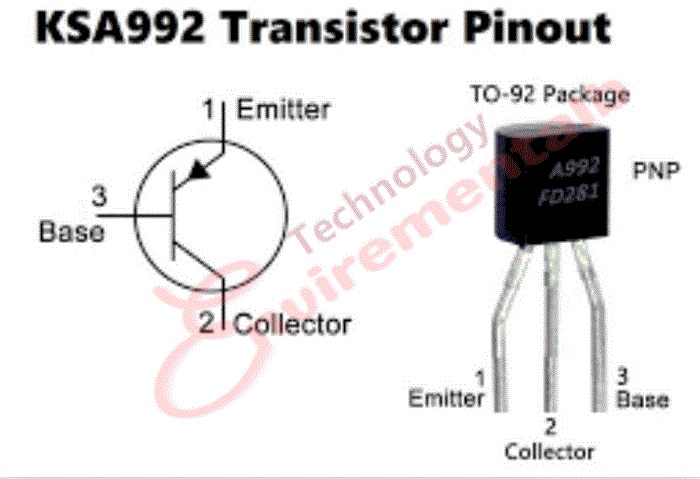In this article we are going to explain the KSA992 transistor pinout, equivalents, uses, specs, and other important and useful information about this high-gain and low-noise transistor. The transistor is a high-gain and low-noise PNP transistor available in package TO-92. This transistor has quite good specs, such as up to -120V collector-to-base voltage, collector power up to 500 mW, 50 to 100 MHz transition frequency, DC current gain up to 800, max noise voltage of 40 mV, etc. The transistor is basically designed for low-noise audio amplification, but due to its good features, it can also be used in a wide variety of other applications, such as any type of low-gain signal amplification in electronics.
Pinout of KSA992 Transistor
The pin detail of the KSA992 transistor is given below in the diagram. It has 3 pins: emitter, collector, and base.
 Technical Specifications of KSA992 Transistor
Technical Specifications of KSA992 Transistor
- Transistor Type- PNP
- Package Type: TO-92
- Max Collector-Base Voltage (VCB): -120V
- Maximum Collector Current (IC): -50mA
- Max Collector-Emitter Voltage (VCE): -120V
- Emitter-Base Max Voltage (VBE): 5V
- Collector Dissipation Max (Pc): 500 mW
- Transition Frequency (fT): 50 to 100 MHz
- Minimum and Maximum DC Current Gain (hFE): 150 to 800
- Maximum Storage, Operating and Junction temperature range: -55 to +150 Centigrade
PNP Complementary:
The PNP complement of the KSA992 transistor is the KSC1845.
Replacement and Equivalent:
Your can replace 2SA988, 2SB1212, KTA1268, 2SB1387, 2SA1285 in the place of KSA992
Absolute Maximum Ratings/Safe Operating Guidelines
Must keep in mind the flowing instructions before use transistor for the safety and for getting full result
It is best to use all the transistors at least 20% below their absolute maximum ratings, and hence the same applies to the KSA992 transistor. The max collector current is -50 mA; therefore, do not drive a load of more than 40-55 mA. The maximum collector-to-emitter voltage is -120V; therefore, do not drive a load of more than -90-96V, and always store or operate the transistor at temperatures above -55°C and below +150°C.